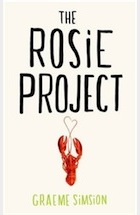An autistic professor makes an endearing comic hero in Graeme Simsion's entertaining novel

Graeme Simsion's 'comic approach is what makes his novel distinctive'. Photograph: James Penlidis Photography
 Whether we become what we are through our genes or through our experiences in life is the old chestnut that this debut novelist tackles with refreshing originality, wit and verve.
Whether we become what we are through our genes or through our experiences in life is the old chestnut that this debut novelist tackles with refreshing originality, wit and verve.The memorable comic hero, Professor Don Tillman, a university teacher of genetics living in Melbourne, exhibits characteristics of Asperger's syndrome – although does not yet realise it – and his compulsively readable first-person narration demonstrates the gulf between his literal interpretations of human behaviour and the actuality, creating considerable dramatic tension. "Predicting the impact of actions on other people is incredibly difficult," he explains, deadpan.
The subject of autism has been tackled in fiction before, most famously in The Curious Incident of the Dog in the Night-Time by Mark Haddon, published in 2003 and currently on stage in the West End.
Whereas that novel filtered life through the perspective of 15-year-old Christopher Boone, Simsion here explores the effects of the condition upon adulthood – and his comic approach is what makes this novel distinctive. "I am an expert at being laughed at," Don acknowledges, but this is far more subtle than two-dimensional comedy, for while we laugh at him, we also come to laugh – and cry – with him, as Simsion skilfully creates empathy for Don and his struggle to empathise.
Intent on marrying, the chronically single professor embarks upon "The Wife Project", devising an obsessively detailed screening questionnaire for prospective partners, ruling out smokers, drinkers and bad time-keepers, among many others. The feisty young smoker Rosie is far from his ideal but he becomes engrossed in "The Father Project", helping her to search for her biological father, a detective puzzle that involves ingenious ways of garnering DNA samples from suspected fathers – which cleverly reveals much about Don's own identity.
What role should emotion play in life? Don's initial instinct is "to be vigilant that emotions do not cripple us". The novel excels in showing how human character is far from fixed, demonstrating Don's development as he gradually grows in emotional literacy and self-awareness through reading, observation and "educational material", devouring films from When Harry Met Sally to To Kill a Mockingbird, until he "slowly began to make sense of it all".
This entertaining romantic comedy began life as a screenplay, which is reflected in the pacy plot that takes the protagonists on a journey from Melbourne to New York, and through the fascinating terrain of human DNA, shedding insight into the science of how we are what we are. First published in Australia, the book has become a global phenomenon, with publication deals in more than 30 countries, reportedly earning the author advances of more than £1.2m.
Filled with engaging specificities of character and setting, the professor's struggle to understand the "fundamental, insurmountable problem of who I was" also becomes a poignant universal story about discovering how best to reconcile logic and emotion, head and heart, and connect our lives with others
No comments:
Post a Comment